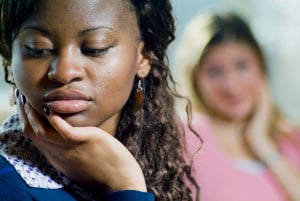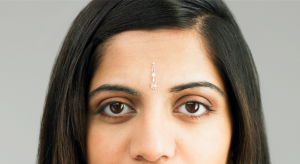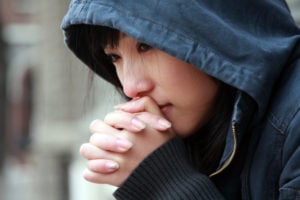In the United States, as in many places, Christianity has long been seen as the default.
From the Thanksgiving narrative of the persecuted Christian pilgrims finding refuge in the United States, to the unquestioned holiday closings for Christmas and Easter, to the simple fact that a Christian God is regularly invoked everywhere from the National Anthem to citizenship tests, Christianity is prevalent.
As a result, Christians – whether they’re observant or not – benefit from privilege in a similar ways that people of other dominant groups do.
They don’t have to constantly defend their identities, nor are they expected to fight for their rights to practice their religion. Similarly, they can enjoy social mobility and expect to live free from violence and discrimination directed at them as a result of their faith.
And despite the fact that fewer and fewer people are calling themselves Christians, 71% of Americans still identify as members of this religion. That’s a pretty big percent of the population, so it isn’t really surprising that being Christian is often seen as the norm.
I know a little bit about this. Though as a white, middle class, cisgender woman, partnered with a man, I have definitely benefited from various forms of privilege, as a Jewish person, I have been made an outsider by the Christian privilege front.
For example, I grew up in Western Canada in the 80s and 90s, and I entered kindergarten at a time when public schools had just begun to phase out having kids recite the Lord’s Prayer every morning.
And though my brother and I were the only Jewish kids at our elementary school, the school was by no means exclusively Christian. In fact, it drew from large South Asian and Asian communities and many of the students were Sikh, Hindu, and Buddhist.
Yet, while Christianity was a huge part of our school’s culture, I don’t recall learning about any of those traditions – let alone about my own.
I do, on the other hand, remember my mom suggesting to the music teacher that he consider picking a more seasonal and less Jesus-invoking carol for the annual Christmas concert and being told in no uncertain terms, “This is one country. We all sing the same songs.”
And, unfortunately, the dominance of Christianity is not something unique to my childhood time and place.
After living in the United States for over 15 years, I am regularly reminded that Christianity is what is expected here, as well. Yet in a place that claims a separation of Church and state, it just doesn’t have to be.
In fact, it shouldn’t be.
So to begin challenging this form of privilege, it’s helpful to first understand how similar it is to other forms of privilege, and then to identify the ways it typically manifests.
The Links Between Christianity and Other Forms of Privilege
Christian privilege has a lot in common with its bedfellows: white privilege, cis/hetero-privilege, and male privilege.
Like members of these groups, Christians don’t really have to think about their environment because, for them, that environment generally caters and conforms to their needs and practices.
A Christian can casually mention going to church or celebrating a holiday without considering how others might respond. Conversely, they can make a disparaging remark about their faith without worrying that doing so will either make them seem strange or will reflect badly on their religion as a whole.
Hence, Christians can feel safe in their space.
And much like members of other privileged groups, many Christians don’t want to acknowledge their privilege and go so far as to bristle when it is pointed out.
As Austin Cline, an expert on agnosticism and atheism asserts, in an increasingly pluralistic world, a lot of contemporary Christians see their privileges declining and interpret this not as the appropriate response to leveling the playing field, but rather as form of persecution.
He explains how this is similar to other forms of pushback and writes:
“The same is true when men complain about the decline of male privilege and whites complain about the decline of white privilege. The defense of privilege is a defense of dominance and discrimination, but for those who benefit, it’s a defense of their traditional way of life.”
This “traditional way of life” is reflected not only in the countless Church wedding scenes found in just about every rom-com flick ever, to day to day things like the fact that while I get ticketed the second I double park to unload groceries in front of my building, the Church goers next door can spend all afternoon blocking traffic without recourse.
Indeed, Christians benefit from being seen as the expected and normal reflection of North American society.
Because of this, other groups – both members of different religions and those who have no religious affiliation – are marginalized and othered.
So how does this occur?
In addition to the most obvious places we see this, such as the prominence of Christian representation in American culture and in the public celebration and respect for Christian holidays – including the continued recognition of the weekly Christian Sunday Sabbath – there are a few other important places where Christian privilege appears that are less visible.
Here are three of those.
1. The Public Expression of Religion
Many Christians don’t think twice about wearing a cross around their neck, sporting a T-shirt related to their church’s event, or putting up a bumper sticker praising Jesus on their car.
But for people of other faiths, outward expression of their religion can lead to violence and harassment.
For example, the Sikh Coalition reports that in the first month after the 9/11 attacks, there were over 300 documented cases of violence and discrimination against Sikh Americans throughout the United States, and that by 2008, the FBI had recorded over 9000 hate crimes against Sikhs.
And while the TSA claims that it doesn’t profile, many Muslims would disagree with this claim, especially in light of TSA guidelines that specifically target people traveling to or from 13 Muslim-majority nations for heightened screening.
Additionally, in countries including Canada, France and Holland, there have been movements and legislation to ban religiously associated head coverings for people working in civil service jobs, at schools, and even just in public at all!
But such bans rarely extend to something like a nun’s habit, which has long been an accepted sign of Christian religious affiliation.
Add to this the recent violence against Jewish people in many countries across Europe, and it’s hard to ignore the ease at which Christians can visibly move through places where they are the majority that is just not afforded to people of many other religions.
And while Christians in non-Christian majority countries have also suffered persecution, that doesn’t negate the fact that Christian privilege is not just something seen in the United States.
2. Bias at Educational Institutions
Christians can generally assume that their children will have teachers who share their religion, that many of their core values and beliefs will be woven into class curriculum, and that their children will not be judged negatively for their beliefs.
On the flip side, many non-Christian students often find themselves the sole representatives of their faith at school.
This can result in students either feeling like they have to be their religion’s spokespeople or representatives or feeling like they have to downplay their difference.
It can also mean that non-Christians are expected to conform to a Christian standard.
That’s a lot to ask of a young person who is likely also trying to fit in at school in a thousand other ways!
Additionally, in plenty of places, beliefs that aren’t considered mainstream or are contradicted by American law or scientific findings, are actively denounced by schools. Not so when it pertains to Christianity.
One of the most striking examples is the continued fight (typically brought by evangelical Christians) against teaching evolution in schools.
This has resulted in 13 states (Arizona, Arkansas, Colorado, Florida, Georgia, Indiana, Louisiana, Ohio, Oklahoma, Tennessee, Texas, Utah, Wisconsin) and Washington, D.C. teaching creationism either in public schools or in private schools, which use taxpayer money to fund state tuition voucher or scholarship programs.
Additionally, new bills to prevent teaching evolution continue to be introduced at an alarming rate.
And if you think this just happens in the States, think again. My home country of Canada is dealing with the very same thing.
Christian privilege also appears in postsecondary institutions.
One of the key ways we see this occur is that non-Christian students who discuss their beliefs may be assumed to have a political agenda even if their view are purely spiritual.
For example, in more progressive institutions, Jewish students are sometimes assumed to have conservative political views relating to Israel and Palestine. And Muslim college students, on the other hand, are often believed to have terrorist ties.
As an exposé in the New York Times found, monitoring Muslim student groups is often par for the course. The article highlighted an instance where a man said the police department had paid him to spy on Muslims.
The article reported, “He was assigned to spy on a lecture at the Muslim Student Association at John Jay College of Criminal Justice even though the police did not think the group was ‘doing anything wrong.’ He said his handler told him that the department considered ‘being a religious Muslim a terrorism indicator.'”
Educational institutions, like many other areas of society, still view Christianity as the baseline but measuring everything else against this can have deeply harmful effects.
3. Christianity as the Default in Legal, Political, and Health Matters
Many people don’t realize that a Christian world vision colors areas as diverse as politics, legal protections, and even healthcare.
Here are some examples of how privilege can benefit Christians in these types of situations:
- Politicians responsible for legislation and governing are most likely to be Christian.
- Christian politicians can make decisions citing their faith without being labeled extremists.
- When swearing an oath, Christians can assume they will place their hand on a text from their religion.
- Christians being tried in court, can assume that the jury of “your peers” will include many members who share their faith and and as a result won’t hold their beliefs against them when coming to decisions.
- If a mixed faith couple splits up, a Christian parent is more likely to be given custody of children.
In addition to these areas, Christianity privilege can even be found in some health-related situations.
For example, many substance use and eating disorder treatment programs – including those covered by insurance – employ Christian values.
As one eating disorder program explains on its website, “Our non-denominational, Christian-based program warmly accepts all clients regardless of their belief preference.” Now that is a nice sentiment, but it doesn’t always translate to a comfortable environment for all.
A few years ago when a non-Christian student of mine attended a similar program after being assured that there was no expectation of Christianity incumbent on participants, she was threatened with expulsion for non-compliance after simply refusing to pray before meals.
The message being “Sure, we accept you, non-Christian – so long as you act like we do.”
Atheists, agnostics, and people of other faiths may be assured that their rights and choices will be protected, but these assurances are often given by those who just can’t shake a very Christian world-view and look with suspicion upon those who subscribe to an unfamiliar set of beliefs.
Checking Privilege
Many mainstream Christians, even those who aren’t not particularly religious, don’t realize the impact of the privilege they enjoy.
But if you identify as Christian and are concerned about this issue there are some things you can do to dismantle it.
You can make an effort to learn about other religions and acquaint yourself with what it means to be an atheist or non-religiously affiliated.
Plus, it never hurts to check your defense mechanisms.
Challenging privilege is not an attack on your beliefs. It’s just making space for other views and perspective.
Talking about privilege of any sort makes a lot of people uncomfortable, but discomfort is not a good enough reason to pretend that privilege doesn’t exist, and denying of its power sure won’t dismantle it.
[do_widget id=’text-101′]
Ellen Kate is a Contributing Writer for Everyday Feminism. She’s a health educator, sometime writer, and mom. She has worked at Manhattan’s Museum of Sex, developed sex education curricula in Mumbai, India, and run HIV prevention programs for at-risk teens in the South Bronx. Currently, Ellen teaches human sexuality at Brooklyn College (something she also did at Rutgers University). Ellen also runs About.com’s LGBT Teens site. More of Ellen’s writing can be found here. Follow her on Twitter @ellenkatef.
Search our 3000+ articles!
Read our articles about:
Our online racial justice training
Used by hundreds of universities, non-profits, and businesses.
Click to learn more





















